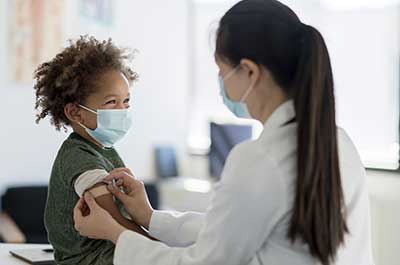When your child gets sick and needs medication, you want to do whatever you can to help them get well. But for kids who are allergic to common drugs, that can be a challenge—and potentially even dangerous.
Bad reactions and true medication allergies are rare, but they do affect up to 10% of the population. “It’s easy to mistake an adverse reaction for an allergic one,” says Christian Nageotte, M.D., a pediatric and adult allergy and immunology specialist at Henry Ford Health. “It’s important to recognize the difference.”
Drugs That Cause The Most Allergic Reactions
Any medication can cause a bad reaction. But there are a few that are most likely to result in a true allergic reaction.
“Antibiotics in the penicillin family are the most frequently reported cause of medication allergies,” says Dr. Nageotte. This includes not only penicillin but also some other drugs that fall into the beta-lactam class of antibiotics, including amoxicillin, nafcillin and ampicillin. While cephalosporins also fall under the beta-lactam group, their chemical structure is different and they are often safe for patients with a penicillin allergy.
Aspirin and other NSAID (non-steroidal anti-inflammatory) drugs are other leading causes of medication allergies. It’s not uncommon for someone to be allergic to both aspirin and other drugs in that category, such as ibuprofen and naproxen.
Symptoms Of Drug Allergies In Kids
Your child can have a bad reaction to a drug or an allergic reaction—and sometimes it’s hard to tell which is which. “An adverse reaction can occur for different reasons—such as taking the wrong dose or in the wrong way,” says Dr. Nageotte. “Also, if your child has mono [Epstein-Barr virus], they could develop a rash that’s often mistaken for an allergic reaction.”

Need A Pediatric Allergist?
The most common symptoms of an adverse drug reaction include:
- Diarrhea or loose stools
- Stomach cramping or pain
True medication allergies can have different—and more dangerous—symptoms. When you give your child a medication, look out for signs of a drug allergy such as:
- Changes to voice (a sign of swollen vocal cords)
- Difficulty breathing
- Dizziness or excessive drowsiness (signs of low blood pressure)
- Hives
- Rash
- Swelling of the lips, mouth or tongue
If your child develops symptoms that make it difficult to breathe, call 911 or take them to the emergency room right away.
How Drug Allergies Develop
Contrary to popular belief, your child will rarely have a true allergic reaction to a medication the first time they take it. “In order to have an allergic reaction, your body must have already been exposed to the medication and developed some antibodies to the drug,” says Dr. Nageotte. “Once your child is re-exposed to the same drug (or one in the same category), they can experience a reaction to it.”
That’s why it’s possible for your child to develop an allergy to medication as they get older. “The more times you’re exposed to a drug, the higher the risk of a reaction,” says Dr. Nageotte.
Your child’s reaction to drugs they’ve been allergic to in the past can also change. It’s possible to outgrow an allergy to penicillin or other drugs.
How To Keep Your Kids Safe From Medication Allergies
If your child has already had an allergic reaction to a medication, make sure that information is included in their medical records. If they have a severe drug allergy that causes anaphylaxis (a reaction that puts the body into shock and blocks airways), your child should wear a medical alert bracelet.
Medication allergies aren’t typically hereditary. “Having a parent who is allergic to penicillin doesn’t mean the child will be too,” says Dr. Nageotte. It’s possible to test for a penicillin allergy, but “there are no reliable tests for other types of drugs, so we need to rely more on reported history and symptoms,” he adds.
Children who are allergic to penicillin and related antibiotics do have safe alternatives. Your doctor will need to select an antibiotic that’s not part of the same beta-lactam category. Antibiotics such as some cephalosporins that have a significantly different structure, macrolides, tetracyclines and fluoroquinolones typically won’t cause a negative reaction in someone who’s allergic to penicillin.
The bottom line: Always ask your doctor about any possible side effects of medications they recommend for your child. Know the signs of an allergic response and seek care immediately if your child has a severe reaction.
Reviewed by Christian Nageotte, M.D., a pediatric and adult allergy and immunology specialist who sees patients at Henry Ford Medical Center - Columbus, Henry Ford Medical Center - Fairlane and Henry Ford Medical Center - Sterling Heights.



